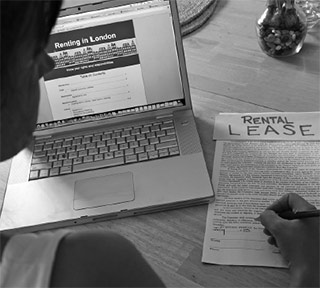Know your rights as a student renter
 CREDIT: NATALIE QUINLAN
CREDIT: NATALIE QUINLANBefore signing your lease, drop by F2010 for a second opinion.
Well, it's that back-to-school-shopping, classroom-finding, orientation- going, and lease-signing time of year again and Interrobang wants to make sure your transition into this school year is one of the easiest yet.
We have high hopes that as young adults, you've already mastered the art of buying school supplies and navigating your way around a campus, so let's focus on something that, for many of us, is totally new: renting a place off campus.
Fanshawe has an on-campus office located in Room F2010 (Counselling and Accessibility Services) to assist you in all your renting inquiries, but in the meantime, here's a guide to some of the most commonly asked questions when it comes to renting.
As a starting point, Glenn Matthews, housing mediator for Fanshawe and Western University, advised that students follow three simple steps before signing that golden document: 1) Stop by Room F2010 to have your lease looked over; 2) Talk to a current or previous tenant about the living conditions of that particular location, and; 3) Know what legislation your lease falls under and whether or not it's covered by the Residential Tenancy Act (RTA).
“Students who share a bathroom or kitchen with the owner or owner's family are not covered by the RTA, which means the owner of the property has full rights to dictate the rules of the house,” said Matthews.
For other tips on off-campus living, Matthews also suggested to check out the “Renting in London” document (tinyurl.com/fan-housing2013). General information is provided in this booklet geared to assist students before and during their renting experience, including answers to real-life renting scenarios, renting FAQs and a breakdown of your rights as a student renter. And as for giving your Social Insurance Number to a landlord? “Never,” said Matthews. “Your SIN should never be given to a landlord.”
Additionally, the Housing Mediation page (tinyurl.com/fanhousing2013) provides students with other useful documents including an Accommodation Chart, Fire Safety Checklist, Sublet Agreement and even a Roommate Agreement.
“If you're going to rent with roommates through a joint lease, recognize that you're liable for your roommates' behaviour,” said Matthews. “Students can use the Roommate Agreement document located online to ensure that the group's renting experience goes smoothly.”
Renting a new place can be an exciting and simple experience, provided that you do your homework. The more time you invest learning your rights as a student renter, the more comfortable your transition into your new digs will be.













